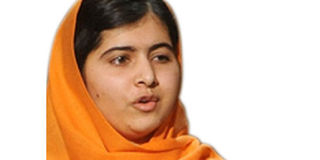Malala’s journey to the Nobel Prize

Malala Yousafzai
What you need to know:
Yousafzai Malala. The 17-year-old became the youngest person to ever win this award early this month.
She is the youngest person ever to have won the Nobel Peace Prize, and deservedly so. Malala Yousafzai, 17, won the award for her relentless campaign for girl child education and rights.
From a remote village in Swat Valley in Pakistan to the corridors of the United Nations in New York, Malala’s star is not about to wane.
She was first catapulted on the world scene at the age of 15 when the Taliban waged a war against girl education in Pakistan. Malala refused to be silenced and fought for her right to education.
Family life
Her biography is a fascinating tale of a family displaced by terrorism, a fight for girls’ education, a father who has championed and encouraged his daughter to write and attend school, and of brave parents who have a fierce love for their daughter in a society that prizes sons.
In 2009, the publication of a diary of an 11-year-old fighting for her education and that of girls in a Taliban-controlled area captivated audiences in Pakistan. Aged 11 and writing under the pseudo name Gul Makai, it was Malala behind the anonymous diary.
As schools closed for the winter of that year she wrote; “The girls were not too excited about vacations because they know that if the Taliban implemented their edict of banning girls’ education, they will not be able to come to school again. I am of the view that the school will one day reopen but while leaving, I looked at the building as if I would not come here again.”
She documented the anxiety she and her friends felt as they saw students dropping away from class for fear of being targeted by militants, and as the girls began to attend school in plain clothes rather than uniform, so as not to draw attention to themselves.
Fleeing from the war
Eventually, Malala and her family, like thousands of other residents, fled Swat Valley when a government military operation attempted to clear the region of the Taliban militias.
Her family returned shortly and the young Malala went back to school. She had been noticed though and her family became a target for the Taliban.
The bullet incident
On October 9, 2012, she was shot at point blank range while on her way from school in a school bus. Saying they targeted her for “promoting secular education. But Malala was not to be silenced.
The bullet had missed her skull and gone through the skin of her head from one end to the other, into her shoulder. With the fame she had gained, international help came in fast and she was flown to Queen Elizabeth Hospital in UK where she got specialised treatment.
The following year, she was named one of TIME Magazine’s Influential People of the Year 2013, and won the European Parliament’s Sakharov prize for Freedom of Thought and had her autobiography, I am Malala released the same year.
The more rational thing to do seemed like abandoning her activism, but the young activist had other plans. Her tormentors had just given her the impetus to take her battle to higher grounds. Earlier this year, when over 200 school girls were abducted by the Nigerian terror group, Boko Haram, she met with the Nigerian president, Goodluck Jonathan, lobbying for action to secure the girls’ release.
At 16, she has become a girl child education activist of international acclaim.
With support from her father, Ziauddin Yousafzai, who operated a private school Malala’s activism was encouraged when her father encouraged her to start a blog called “I want every girl, every child to be educated”.
Though she was doing it incognito her cover was later blown as the girl blogger from Swat.
On her list of awards
Malala was first nominated in 2011 for the International Children’s Peace Prize by the Kids Rights Foundation. In 2012, the Pakistani government awarded her the National Peace Award, which was later renamed the National Malala Peace Prize for those below 18 years.
Malala has risen from the shackles of the Taliban-controlled remote Northern Pakistan region tojoin a club of Peace laureates like Nelson Mandela, Archbishop Desmond Tutu and Tibetan leader Dalai Lama.
Fact file
Malala Yousafzai is a Pakistani activist for female education, who became the youngest ever Nobel Prize recipient in any category.
Born: July 12, 1997 (age 17), in Mingora, Pakistan, she is at Edgbaston High School in UK where her father works with the Pakistan High Commission. She is the eldest and only girl of three.
Books: I am Malala: The girl who stood up for education and was shot by the Taliban.
Parents: Tor Pekai Yousafzai, Ziauddin Yousafzai.
Awards: Nobel Peace Prize, Sakharov Prize National Malala Peace Prize 2011, Simone de Beauvoir Prize 2013, Ambassador of Conscience Award 2013, and the the US Glamour Award for Woman of the Year 2013.
Nominations: International Children’s Peace Prize 2011.




